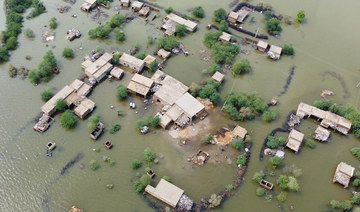ISLAMABAD: Pakistani Prime Minister Shehbaz Sharif on Tuesday called on his predecessor, Imran Khan, to join him in a “united effort” to tackle the “epochal” rains and flooding that have killed more than 1,100 people since mid-June, affected 33 million, and destroyed homes, businesses, infrastructure and crops.
The unexpected “olive branch” comes as the two leaders are locked in a bitter political battle. Khan, who was ousted in April in a no-confidence vote in parliament, refuses to recognize the government and has been leading mass rallies in an attempt to seek early elections. The Sharif-led coalition government has said elections will be held as scheduled next year.
Khan won the 2018 general election following vows to root out corruption among what he portrayed as a venal political elite. The former cricket star has for decades viewed veteran politicians such as Sharif — and his elder brother, Nawaz Sharif, a three-time prime minister convicted on corruption charges and living in self-exile in London — as long overdue for accountability.
On Tuesday, Sharif told journalists he had extended several offers, including one this month during a speech in parliament, to Khan asking him to join with the government in its attempts to tackle the myriad crises facing the South Asian nation, in particular the economic woes that have left it with a large current account deficit and critically low foreign exchange reserves.
“I offered, as you will, an olive branch, a very sincere proposal, a charter of economy … (that said) let’s sit down and discuss it, let us make a framework,” Sharif said, speaking in the Prime Minister’s Office. “It was a very bitter experience that this offer was absolutely taken as a non-serious thing, which was very unfortunate.
“Today, even at the cost of repetition, I am making this offer (to Khan) through your cameras … Let us sit down … to deal with this (floods) situation today and tomorrow, and to see Pakistan comes out of this problem with our united effort let’s move with unity of thought and action, let’s move in unison. That is the way forward.”
It comes as Khan faces a number of court cases, including charges of terrorism and contempt of court, which he said are politically motivated. The use of anti-terrorism and sedition laws as a basis for cases against political leaders is not uncommon in Pakistan; Khan’s own government also used them against its opponents and critics.
A contempt of court case against Khan is due to begin tomorrow and his one-week, pre-arrest bail in a terrorism case, related to a speech he gave, expires on Sept. 1.
A terror charge in Pakistan can carry sentences ranging from several months to 14 years in prison, the equivalent of a life sentence. A contempt of court conviction could result in Khan being disqualified for life from politics because, according to Pakistani law, convicted persons cannot hold public office.
Should Khan take up Sharif’s offer of a truce, the easing of the political tensions would be welcomed at a time when more than 15 percent of Pakistan’s 220 million population has been affected by heavy rains and floods.
Early estimates put the cost of the damage at more than $10 billion. Hundreds of thousands of people have been forced to flee their homes and live outdoors without access to food, clean water, shelter or basic healthcare.
The specter of food shortages is rising given that much of the country’s farmland and crops have been wiped out by flooding that Sharif on Tuesday described as “the worst in the history of Pakistan.”
On Monday, Finance Minister Miftah Ismail said the government might consider importing vegetables and other food items from its neighbor, and archrival, India to help cope with shortages.
Such imports would end three years of suspended trade between the nuclear-armed rivals. Islamabad banned imports from India in 2019 after New Delhi revoked the special constitutional status of the portion of the disputed Kashmir valley it governs. India and Pakistan have fought three wars over Kashmir. They both control parts of the region but claim all of it.
However, Sharif reiterated that it will be difficult to restore trade links until India reviews its decision to revoke Kashmir’s special status.
“Even until today I will be very pleased to facilitate and discuss our problems with India, including water (and) Kashmir,” he said.
But, referring to what he described as a “genocide” in Indian-administered Kashmir, he added: “Look what they are doing … is there anything left for us to talk to each other (about)?”
India denies allegations of abusing the rights of Kashmiris and says it only targets separatists and militants who launch attacks against the state. It accuses Pakistan of funding armed militants and separatist groups in the Indian-controlled part of the region. Islamabad denies this, saying it provides only diplomatic and moral support to the Kashmiri people.
























